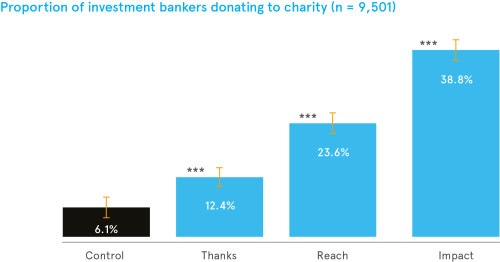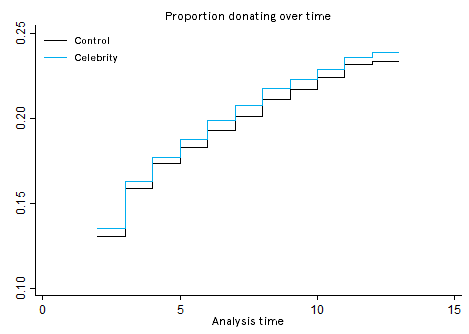In our Update Report, we reported a few new results in the area of charitable giving. Perhaps the most striking of these is the finding of our first “Network Nudge” experiment. In this experiment, we worked with an investment bank to encourage their staff to donate to charity. Instead of asking people to give directly, we found managers in the bank who had given in the past, and asked them to ask their colleagues to donate. Here are the three interventions we tested against a control group who did not receive any extra message.
The results are impressive – leveraging the power of social networks in this way increased the proportion of people donating from 6.1% to 38.8% – an increase of more than 500%.
Not everything that we’ve tried in this area has been so successful, however. In two studies, we tested the impact of celebrity endorsement on charitable contributions. Across these two studies, we did not find significant effects of the endorsements overall, but we did find modest effects for wealthy potential donors and for people who have donated to the charity in the past – something consistent with the previous literature in this area . The main effect of the endorsement, however, seemed to be to make the donations happen slightly faster.
In a third set of studies we looked at the effect of various types of matching on donations. Matching – where potential donors are told that if they give money it will be topped up, or ‘matched’ by a third party, often a large philanthropist. This method of encouraging donations is expensive, but has been shown to be successful in the past. In our experiments, we test the use of both standard matches and some of the non-standard matches suggested in our 2013 paper. Interestingly, across the studies we find no statistically significant impact of any type of matching.
This shouldn’t be taken as an indication that matching doesn’t work – there are a number of studies showing that it does. However, what this does suggest is that context is key. Our studies, which were conducted through Just Giving and email, may have struggled to resonate with small value donors, or with people who are primarily donating in order to support their friends.
What we’ve learned is that behavioural science can definitely help charities to boost their income, but that rigorous testing, not just solid theory, is a must.




